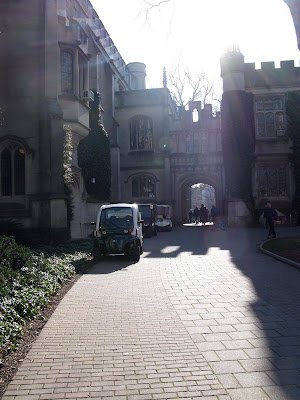It's New Year's Eve, and instead of writing my Dean's Date papers or battling the latest New England snowstorm to drink awkwardly with people from middle school whom I don't remember, I'm bringing you the 'Prince' year in review*, based on our most-commented stories**. After the jump, the eight that mattered in '08.
#8: Tenure road rough for professors (54 comments)
It might surprise you to learn that tenure is kind of like Bicker, except that, in the case of tenure, being in a sorority doesn't help you that much.
#7: NOM was the top donor to fund Proposition 8 (59 comments)
My main reaction to this was to say "nom nom nom" aloud several times and visit the LOLcats website. But $1.8 million is nothing to mess around with.
#6: Freshman hit at BlackBox event, fight ensues (61 comments)
Oh and by the way, the guys who beat a girl up were Bloods.
#5: University grants Chabad chaplaincy (64 comments)
This was a really big deal ... I think? As a Gentile, I am confused by the whole Chabad saga ...
#4: Students rally for ironic 'Princeton Proposition 8' (81 comments)
The other response out of Princeton, N.J. to Proposition 8.
#3: Weinstein ’09 endorses Weinberg '11 for USG VP (106 comments)
Cripes, I just don't have the energy for this one. It happened so recently and it took up so much time that I cannot summon the will to care.
#2: Investigation into alleged admissions bias expands (296 comments)
I suspect that many of our most commented stories are kept alive by two or three commenters, but no one so far has approached the heroicism of Yale College Dad. The comments thread is basically YCD vs. all comers, and many of his posts are the length of entire 'Prince' columns. If you were wondering what happens to the kid in your precept who writes Russian novels on BlackBoard, here is your answer. By the time the commenting died down two months later, Yale College Dad was referring to himself in the third person using an acronym. Internet trolls, this is your role model for 2009.
#1: University band harassed by cadets at Citadel (582 comments)
This one wasn't even close. After our band went to the Citadel, did some really rude things (or didn't, depending on whom you believe), got beat up (or didn't, depending on whom you believe,) everyone retired to the intertubes to flame each other and thereby win the true moral victory. This story also set a record for the number of comments we had to delete as in-a-pro-pro — seriously, the deleted comments alone (135) would beat out all but the top two most commented stories on this list.
So there you have it: 2008 in 'Prince' comments. Notice any themes? I see gays, Judaism and people getting beat up. Happy 2009, everyone.
*This is only since the advent of our new website in early February-ish, so before that, I don't know. But we don't publish that much in January, anyway. Or get that many web hits. (Well, sometimes we get a lot of web hits in January. But I digress...)
**I was going to do it based on web hits, but the problem is that whenever something gets linked to by a blog, our web hits go nuts and it's not really a good barometer of what got the most discussion on our campus.
Wednesday, December 31, 2008
Should old flame wars be forgot: 2008 in 'Prince' comments
Tuesday, December 30, 2008
So, you're still not over Twilight...
I admit: I am that girl. You know, the girl who read all four Twilight books and went to see the movie and (don’t laugh) thought Edward’s crooked smile was adorable. It sounds bad, but I’m here to confess my latest sin against intelligent thought. Even after I realized that the books were ridiculous and the movie was a low-budget, ridiculously cheesy farce that may have violated the Geneva Conventions by tormenting its audience with heaps of sloppy, angsty dialogue, I went back for more: I read the partial draft of “Midnight Sun.”
For those in the know (or anyone who’s remotely interested in the Twilight series), “Midnight Sun” is the first book of the quartet rewritten from Edward’s perspective. Unlike “Wicked” and other spin-off novels, “Midnight Sun” was written (or, to be more accurate, is in the process of being written), by Stephenie Meyer, the imaginative woman who penned the first four Twilight books. When someone in Meyer’s camp first leaked the draft of “Midnight Sun” she was furious over the apparent violation of her rights as an author and swore never to finish the novel. According to her website, she doesn’t want anyone to read the viral version of “Midnight Sun” but she also doesn’t want to spur readers to seek out the illegal version. As a compromise, she posted to the draft on her website but urged her fans not to read it. Luckily, I’m not a fan.
First, I need to add a little disclaimer. “Midnight Sun” only makes sense if you’ve read all of the other Twilight books. Many of the details of vampirism or the Cullen family history (for example, Jasper’s story) to which Edward alludes during his narration appear only in the last couple of books in the series. Wading through Edward’s tangled psyche is trying enough without having to figure out what you’ve missed from the other books. If you attempt “Midnight Sun” without the background provided by the rest of the “Twilight” books you might assume that you didn’t enjoy the draft because you missed some of the details when, in fact, you probably didn’t enjoy it because of the awful writing and tedious pace.
Question: Why read “Midnight Sun” at all?
Answer: You probably shouldn’t but sometimes you’re just THAT bored. Maybe you liked the books. Maybe you saw the movie. Maybe you thought the combination of the first two left something to be desired, so you kept digging.
For what it’s worth, “Midnight Sun” compares nicely with the original version of “Twilight.” In some ways, the vampire version is better, but in other ways, much worse. During pre-production for the film, Meyer and Robert Pattinson, who played Edward in the movie, worked together to develop a believable personality for the blood-sucking protagonist. The two disagreed on certain aspects because Pattison took the character to a tortured extreme. In several interviews, he said that he drew most of his inspiration for Edward from the “Midnight Sun” version. Well, that would explain why the character was such a huge creeper.
Essentially, “Midnight Sun” is not so much a different version of Twilight as it is a creepier version of Twilight (and I mean much, much creepier.) For what it’s worth, the creepiness does make the narration more interesting. My biggest gripe about Twilight was Bella’s lack of depth as a character. Her motivations seemed so ridiculous. She was just acting out a teenage daydream and projecting unrealistic fantasies on the people around her. How boring. In contrast, Edward is seriously sick in the head. Every sleazy voyeur dreams of Edward’s powers. Not only can he scale walls and silently climb into the bedrooms of unsuspecting girls and not only can he remain completely still while observing his subject for hours, he can read minds. In other words, he can spy on people through their own eyes. He experiences the fantasies of all the high school girls around him from the first person point of view. Talk about freaky—Freud would have loved to get his hands on some of that crazy.
As disturbing as that sounds, it makes for much more compelling reading than Bella’s whiny oh-my-gosh-did-he-just-look-at-me-wow internal monologue. That’s the best thing about crazy people: they are so much fun. Edward’s narration has some of the same attraction that Heath Ledger’s Joker commanded in “The Dark Knight.” You caught hints of Edward’s mental instability in the Twilight books. For example, even the oblivious Bella was a little freaked out by Edward’s penchant for watching her sleep in the original novel. In the “Midnight Sun” version, his psychological issues are a little more apparent. For example, the first time he climbs in her window he realizes he should bring oil to grease up the hinges on the window for future visits. Creep much?
Unfortunately, all good things must come to an end. Just like Meyer’s other books, the narration quickly becomes tedious and plot development slows to a crawl. No amount of crazy can make up for the fact that nothing is really happening in the story. And Edward’s crazy isn’t a dynamic, fluid, fascinating crazy like the Joker. He’s a one-trick pony. His emotional agony, which should have been a symphony of crazy with rolling highs and bitter lows from a century’s worth of experience, had just one note: angst. In the hands of a better author, “Midnight Sun” could have been very cool. Beautiful, bloodthirsty, mind-reading immortal struggles with his conscience for control of his superhuman body, agile mind, and frail emotions—what’s not to love? Unfortunately, Stephenie Meyer is not a better author and “Midnight Sun” has many of the failings of the first version.
So, if you’re like me, no review is going to deter you from satisfying your curiosity, but you’ve been warned. When you’re done reading, you’ll realize that all 264 pages of the draft could be summed up by, “Hi. My name is Edward the Vampire. I like to kill people, but let’s keep that on the down-low while I stalk this high school girl. P.S. I’m in your head.”
Wednesday, December 17, 2008
Slumdog Millionaire is a must see
 Looking for a way relieve your boredom during winter break? Street writer Zack Newick gives his take on the Golden Globe nominated Slumdog Millionaire:
Looking for a way relieve your boredom during winter break? Street writer Zack Newick gives his take on the Golden Globe nominated Slumdog Millionaire:
I come out of the theater feeling slightly dazed and all together happy. It’s freezing and my breath is realized as white smoke in front of my face. I’ve just seen Danny Boyle’s Slumdog Millionaire, a film that manages to make life beautiful. There, I said it. I had forgotten that the words could go together, but there is such a joy in the film, despite impossible hardship and cruelty that it is hard not to feel reassured that love always finds its way.
Danny Boyle, previously the director of Trainspotting, constructs and makes real an India that festers beneath trash and violence yet still shines gloriously through. With scenes of stray dogs and lost children wandering the bustling streets of Mumbai and images that seem to melt through the screen, so noxious are the smells and corrosive the colors, the setting seems something like a dystopian paradise. The story is a simple one: of love struck Jamal Malik, an orphan from Mumbai, and his quest to win the heart of the beautiful Latika, whom he met while at an orphan camp when he was seven. At the age of nineteen, he is a tea server at an Indian telemarketing company and an unlikely contestant on the Indian version of “Who Wants to be a Millionaire?” in the hopes that Latika will be watching, somewhere.
Jamal doesn’t really expect to get very far on the program however, but it turns out that the tragedies he has endured and the small victories he has claimed have given him every answer to the questions on this fateful day. Seeing his mother bludgeoned to death by anti-Muslim marauders, stealing shoes at the Taj Mahal and diving into human excrement for the sake of an autograph end up giving Jamal the exact knowledge he needs for one magical night on television.
The film opens however with his torture and interrogation, as the show's host doubts that an orphan up from poverty could ever win such a prize. But in this fairytale of a story , the worst of India is still gorgeous, and the best of man is accentuated. With a breathless soundtrack and stunning cinematography, Slumdog Millionaire is must-see entertainment.
Friday, December 12, 2008
In case you were still interested in Twilight...
I can’t decide which cliché I should start off with: a sagacious, “Less is more,” or a slightly more frustrated, “Enough is enough already!” Both apply equally well to Stephanie Meyer’s Twilight Series, comprised of Twilight, New Moon, Eclipse and Breaking Dawn. Like so many other eager readers, I was sucked into the vortex of Twilight movie promotion hype, and I found myself thinking, “Hey, it could be interesting, right?”
So, over Fall Break, I found myself at my local Borders bookstore, mocha latte at my side, plumbing the murky depths of vampire romance through the befuddled eyes of Bella, the series’ masochistic little heroine with a hidden talent for mysterious accidents, in Book One of the quartet. I cannot tell a lie: I was amused. I was engaged. I was—in retrospect, I cringe to say it—invested.
Granted, I was mostly “invested” in the dramatic, exquisitely detailed bits about Bella’s vampire beau, Edward, and his gradual deification (by both the smitten Bella and the equally smitten author). The whole book seemed to revolve around Edward. It was essentially a series of snippets of Edward’s slightly deranged personality, with some fluffy filler in between which existed simply to generate greater anticipation for the parts of the book Edward was in. Even the author seemed to be waiting for her next chance to add another glimpse of Edward’s Adonis-like body, his keen intellect, his chiseled face, his superb skills on the piano, and—God have mercy on all the tweens of the world—his perfect, bronze-highlighted hair.
To be perfectly honest, that didn’t bother me in the slightest. I went into Twilight expecting an over-the-top, sickeningly cheesy romance about a crazy girl and a hot-as-hell vampire, and that is exactly what I got. I can respect that, even appreciate it. After studying organic chemistry for most of my Fall Break, I needed that kind of fun, accessible prose to keep me sane.
The problem was the second book…and then the third book…and—the horror, the horror—the fourth book. Don’t get me wrong: I am not a snotty, highfalutin, scholarly-merit-first literature Nazi. I like my beach reads as much as the next girl. I’m the first person to admit that I thoroughly enjoyed Twilight, but I think you have to respect the fact that Meyer is not a great author. In fact, she’s not even a particularly good author. She’s a teen romance author who knows how to give her readers a few cute thrills. She’s smart. She knows how to jazz up an otherwise ordinary romance with a few supernatural elements to keep things interesting.
Unfortunately, none of that can hide the fact that the series had no plot to speak of. She took a decent idea for one book, and tried to drag the poor thing out into four, five-hundred-page, back-breaking novels. Deceptively, the books were thick, but the tension was thin and uninspiring—and non-existent in the case of the fourth book. The obvious lack of plot was forgivable in the first book: I was too distracted by the swooning, lengthy descriptions of Edward and his tormented past to realize (or care, if I had realized) that nothing was actually happening in the book.
But, as you may have heard, there is virtually no Edward in the second book, New Moon, and that’s where things start to fall apart. You start to realize that, hell, this book is all about some self-indulgent, prissy, ridiculously sexually frustrated, needy teenage girl who spends half her time bemoaning her fate and the other half messing up other people’s lives. And you start to wonder why you’re wasting your time when you should be taking the 1996 practice exam for CHM 303.
Regrettably, I assumed that Meyer was working up to some big thrill, a real shocker that was going to turn the series around and make up for hundreds of pages of sloppy angst. I assumed, kept assuming, and kept waiting, right until the end of the fourth book, which ended in the most ridiculously anticlimactic battle scene I have ever had the misfortune of reading.
Since I finished the series, a few of my friends have also picked up Twilight and I have given them all the same piece of advice: Stop there! You might be curious how things pan out in the rest of the series. You might think you need to read at least the second book since there is going to be a second movie. You might want to know if Edward and Bella really do find their happy-ever-after, but, frankly, it’s just not worth it. The first book was good. It leaves you interested, excited, and engaged. It leaves you with a little itch, that hankering to know more about your new favorite coven of compassionate vampires. Don’t scratch that itch. It’s simply not worth the disappointment.
Photo of the Day | Dec. 12, 2008
Woongcheol Yang, Princetonian Associate Editor for Photography
Tuesday, December 9, 2008
Rapid Fire - Holiday Edition
Meet the Freshman has now become Rapid Fire...because the Prox wants you to get to know people of all class years! Hooray! This week, meet...
Beverly Nwanna, '09
Prox: What's your favorite holiday movie?
BN: Ummm, I do get into that one with the kid with the BB Gun. A Christmas Story, I think?
Prox: What's your favorite thing about winter?
BN: Snowfall, but only the first few times, when it's not annoying or inconvenient or dirty yet
Prox: What's your best Princeton memory?
BN: It's a tie between storming Yale's field, quite inappropriately, and the Terrace tap room the night Obama won
Schuyler Softy, '11
Prox: What's your favorite holiday movie?
SS: Home Alone
Prox: What's your favorite thing about winter?
SS: The smell of snow
Prox: What's your best Princeton memory?
SS: Being surprised on my 19th birthday and spending it with all of my friends :)
Konrad Karczewski, '09
Prox: What's your favorite holiday movie?
KK: Love Actually
Prox: What's your favorite thing about winter?
KK: Skiing
Prox: What's your best Princeton memory?
KK: Every night at Terrace
Photo of the Day | Dec. 9, 2008
Anna Irwin, Princetonian Senior Photographer
Diggin' in Mudd: Bragging Rights
 As December drags on, "Diggin' in Mudd" continues to explore the contents of the Admission Office Records found in the University Archives in the Seeley G. Mudd Manuscript Library. This time we move forward to 1958.
As December drags on, "Diggin' in Mudd" continues to explore the contents of the Admission Office Records found in the University Archives in the Seeley G. Mudd Manuscript Library. This time we move forward to 1958.
Princeton University likes to brag about how smart and talented its students are. I could go on listing the other excellent qualities we and the world are told we have, but unfortunately, modesty precludes such bragging. It wouldn't really be nice and dignified if I went on and on about how in 2008, Dean Malkiel bursts with pride mentioning that the new class is composed of more Academic 1s than ever before.
But, since I wasn't here in 1958, it wouldn't really be immodest to brag about how smart Princeton students where in 1958. In fact, I don't even have to brag. I can let the Alumni Council do it for me (they already did). Feast your eyes on this pamphlet which seeks to inform alumni how hard it is to get into Princeton because of the excellent academic program and rigorous expectations reassure alumni that their sons can get into Princeton, no matter how dumb they are.
Wait...
What?
Pamphlet after the cut.
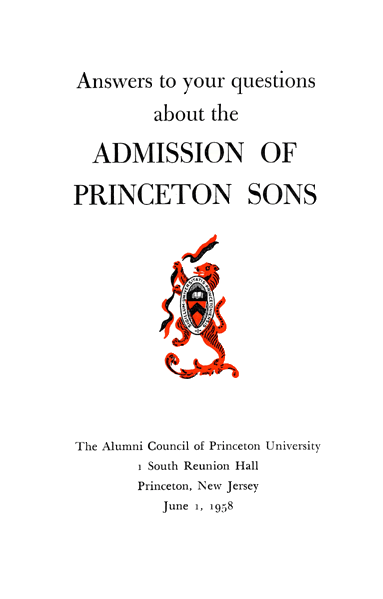
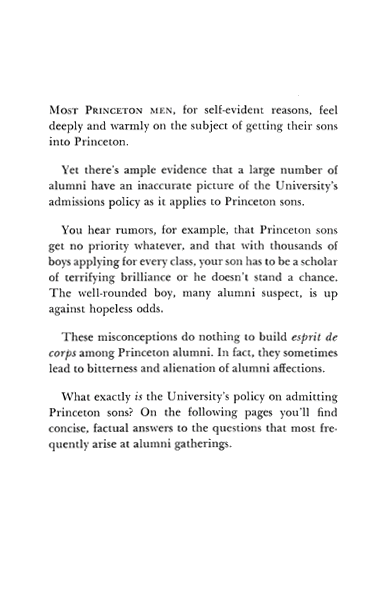
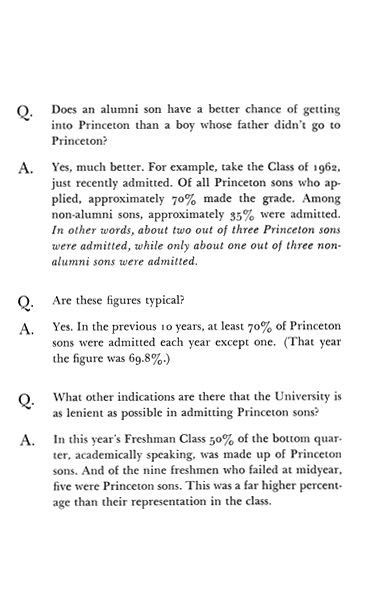
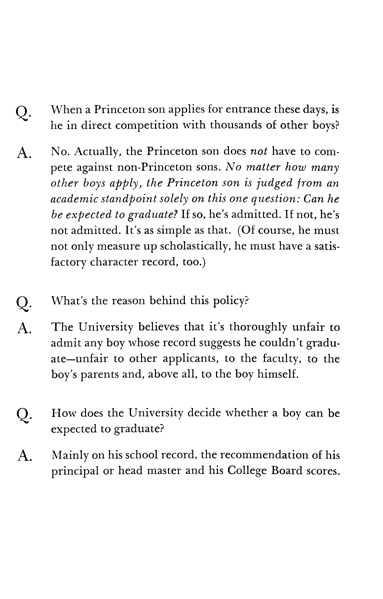
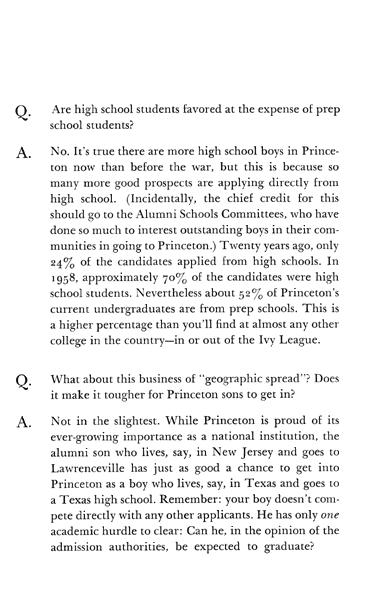
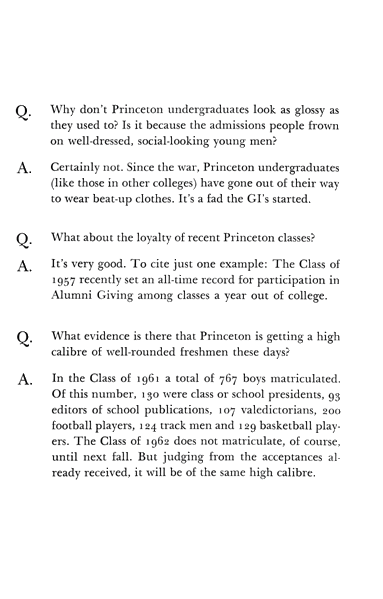
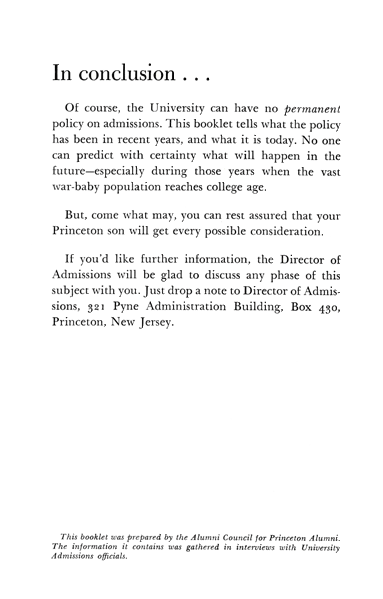
That's right kiddies, in 1958 Princeton was actually bragging about how dumb its students were. Or, at least, how dumb certain of its students were. To be fair, Princeton was also bragging about how smart and awesome its students were... at the same time. Talk about your mixed messages.
All images are courtesy of the Seeley G. Mudd Manuscript Library. Any other use of these images requires written permission from the archive.
Monday, December 8, 2008
Figures of Speech: Three for Three [UPDATED]

This Week’s Don’t Miss:
On Thursday at 4:30 in Dodds Auditorium, former US Senator, NBA Hall-of-Famer and Rhodes Scholar Bill Bradley ’65 will be speaking on Russia. Bradley is one of the few three-term senators ever to shoot threes in the NBA (I have limited sports joke-making ability). Sen. Bradley ran an unsuccessful campaign for the Democratic presidential nomination in 2000. But he did win a gold medal in the Olympics.
Second of three events this week, a three-part (notice a theme?) series Monday, Tuesday, and Wednesday at 4:30 in Dodds Auditorium (notice a theme?), Harvard Professor Stanley Hoffmann will be speaking on international relations (notice a theme?). Specifically, the lecture titles are, respectively, “Understanding the Global System,” “Ethics and Global Policy,” and “US Foreign Policy, Past and Future.”
Please note that I picked these lectures because they were interesting, not so I could keep writing “notice a theme?” Things like this just happen.
Finally (lecture number three!), at 7:30 on Wednesday in Dodds, former US envoy to the Middle East Dennis Ross will be asking “Whither the Middle East?” Ross was an important player in Middle East policy during those years, and continues in that role now as a key adviser to President-Elect Barack Obama.
Enjoy your break, and see you in 2009. (9…that’s 3 squared, isn’t it?...)
UPDATE: The sports joke seems to have fallen flat, and not just because it wasn't particularly funny. It turns out that the NBA didn't adopt the three-point line until 1979, but Bradley retired a few years earlier. Obviously, he never had the possibility of shooting a three-pointer in the NBA. Thanks to David Baumgarten '06 for the tip.
Saturday, December 6, 2008
Diggin' in Mudd: Life before the SAT
 It’s December, which means that the college admission season is winding down. To “celebrate,” Diggin’ in Mudd will be bringing you admissions-related posts throughout the month of December.
It’s December, which means that the college admission season is winding down. To “celebrate,” Diggin’ in Mudd will be bringing you admissions-related posts throughout the month of December.
Standardized tests have unfortunately become a major part of academic life and no American test is more emblematic of these than the SAT. But there wasn’t always an SAT, which was born in the 1920s out of the WWI US Army intelligence tests, which were themselves the first intelligence tests administered en masse.
But even before the SAT, before the Army tests, there was the College Board (fun bit of trivia: the College Board is a Harvard Brainchild, but before you go and tease your Harvard friends over this, know that the SAT itself is a Princeton invention.) And before the College Board?
That means that if you wanted to apply to Princeton, Harvard, and Yale, you had to sit for three different tests. (I applied to ten schools, can you imagine sitting for ten different tests?) Oh, and the tests were only offered in certain places, so if you lived far away from where they were administered, well, you either traveled to where they were being held, or you were out of luck.
Extracts from the tests and commentary, after the jump.
A student seeking admission to the freshman class in 1884 had to pass exams in English: grammar, geography and US history; Latin; Greek; and mathematics: arithmetic, the metric system, algebra, and Euclidean geometry. Don't ask me how US history is part of English.
What were these tests like? Take a look from yourself: here’s the first page of the math section from the 1884 test.
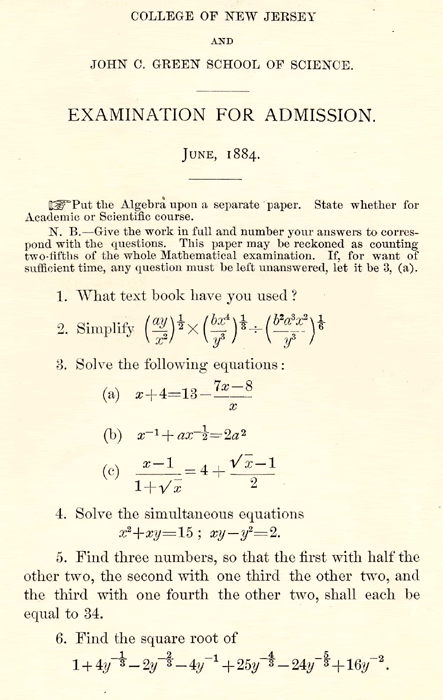
Note that it's completely mechanical. Being a history major, I kind of lost patience with it after 3d — but as far as math goes, it's not very complex, no trig, no calculus. This is the kind of stuff I learned my freshman and sophomore years of high school.
For the English Majors: the topic for the English Essay in 1884 was "Fenimore Cooper: his life and any one of his novels" I don't have the test, but the topic was announced beforehand in a precursor to the admission pamphlets.
So why was getting into Princeton hard in the 19th century
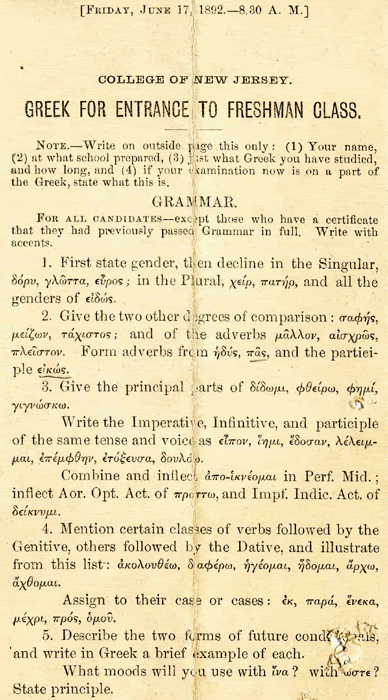
I don't know a word of Greek ("Eureka" hardly counts), but note that again, we see there's a mechanistic quality to the exam. To be fair, this is just the first page; it gets harder, or at least more involved.
Now, the good news: There were prizes.
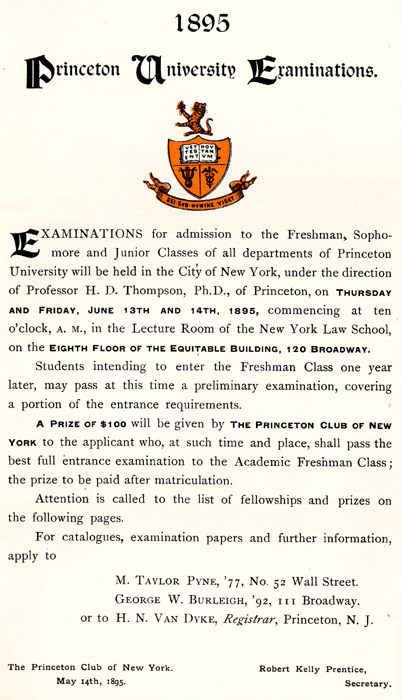
And a hundred bucks was a lot back then. Especially when you take into account that a year’s tuition in 1884, not counting room and board and other expenses, amounted to $120.
All images are courtesy of the Seeley G. Mudd Manuscript Library. Any other use of these images requires written permission from the archive.
Just Friends?
Disclaimer: This post is more or less directed towards the ladies.
Sometimes it seems like all of our interactions with the opposite sex are governed by one age old question: is there such a thing as a purely platonic relationship?
The responses are mixed. Those of us who say yes are shocked when our “just friends” make a move on us. Those of us who say no are disappointed when our prospective life partners find significant others of their own.
So what gives? Is there not a simple answer?
Of course not.
Granted, we all can agree that platonic relationships have to exist. How else can you explain your male neighbors and classmates? The simple platonic relationships are those that aren’t too close. Past a certain point of familiarity, the boundaries become less defined.
Here’s when it becomes difficult. Is your guy just super-duper nice or does he want to be more than just friends?
Sometimes we over-analyze. We think the pats on the back, the invitation to “do something,” and the nice gifts on our birthdays are signs of something more. And maybe they are. Usually, guys tend to lavish attention in similar manners as girls. Girls love to focus on and flirt with their crushes and guys like to do the same. But if the answer was just that simple, then there wouldn’t be hordes of girls confused about the state of their relationships.
It really depends on the guy. As much as we’d like to think that guys are all just simple-minded creatures who all think in the same, uncomplicated manner, that’s simply not true. Guys, as hard as it is to admit, are each unique in their own ways.
Some guys just seem to pay equal attention to all girls they meet. They are gregarious. They flirt shamelessly with everything female that moves and everyone loves or claims to love them.
Look around you. Is everyone flirting with this guy? Do you have something special that sets you apart from the crowd? Do you guys have inside jokes? Cute nicknames? Secret handshakes, maybe? Are you going to be cool with it if you guys become a couple and he continues his behavior?
If not, grab another pole, it’s time to head back out to sea. This time, try to pull out one who is legitimately interested.
Sometimes, though, you might pull out one who is legitimately interested, only to find that he is absolutely cryptic about his intentions. He is attentive and sweet, but never takes the initiative in advancing the relationship.
If this sounds like your guy, drop a slight hint. Not so much that you scare him away. But realize that the guy might just be a bit dense. He might have no idea of your feelings unless you show them. He might also be too worried about rejection to dive in head first and admit he likes you. Sometimes, you need to prod him along just a bit.
This is not to say that you should take the initiative and start the relationship. NEVER be the one to start the relationship. That would be the easy way out, and the route will usually take you off a cliff.
As sexist as this may sound, guys and girls respond differently to taking risks. There’s scientific evidence that guys are more ready to take risks, due to innate differences in the male and female brains. Since starting a relationship is a huge risk (it’s like diving off a cliff, not knowing where or on what you’ll land), if the man who can more easily take risks doesn’t want to take the chance, then don’t even try to get him.
And then there are those other guys you might pick up who have no problems taking that giant leap. Even if you don’t want him to. These guys seem desperate. They call all the time, want to hang out all the time, and never seem to take a hint. You avoid them at all cost for weeks on end, and they still manage to find you and pretend nothing is wrong. Sound familiar?
If you’ve got a guy you can’t shake, drop hints you only want to be friends. But chances are you’ve already tried this and he just can’t wrap his mind around the fact you don’t think of him in that way. So introduce him to someone else who might be perfect for him. Or you can simply dodge him for the rest of your life.
The best solution is to find a boyfriend of your own.
But if that was so easy, why are you reading this?
Friday, December 5, 2008
The Zimmerman Telegram
A round-up of the week's news with Zach Zimmerman '10.
Weinstein ’09 endorses Weinberg '11 for USG VP
Weinstein’s e-mail marks a severe break in precedent as current USG Presidents normally do not endorse candidates in the upcoming race. He also recently broke with precedent by running naked down the halls of Fine rubbing vegetable oil on his stomach screaming “Don’t spank me, Mommy. I’ve been a good boy!”
Nassons collaborate with Ben Folds
The Nassoons teamed up this week with singer-songwriter-piano-player-god-on-earth Ben Folds. They recorded Fold's song 'Time' for his new album of college a cappella covers. The CDs are expected to fly off the shelves since why listen to Ben Folds sing his own songs when you can hear fifteen skinny college boys sing it without instruments? Too Nassoon?University mourns Mumbai loss
A memorial service was held outside Murray-Dodge Hall on Wednesday in remembrance on the terrorist attacks in Mumbai. In attendance were around seventy students and faculty members, who reflected on the attacks through a candlelight vigil. Two grad students, however, only came because they mistakenly thought there was going to be a candlelight dinner.
Deepika Govind ’10, of the South Asian Students Association, encouraged the audience to fully understand the conflict, saying it “cannot be reduced to a political tug-of-war between two countries.” She did, however, believe the conflict could be well understood as a political potato sack race.
Diemand-Yauman '10 unopposed for USG president
Swastika graffiti found in Rocky
D’Souza and Singer debate God, morality
In summary: Singer: Yes. D’Souza: No.
At the conclusion of the event, moderator and Princeton Professor Eric Gregory declared the winner of the debate to be the very attractive programs. They were printed on really pretty glossy paper.
To Do:
Check out an original student work, We Like to Cross Dress, in the Matthews Acting Studio. Or you can head over to Theatre Intime to catch Sex on a Saturday Night 2. Or if you want to sit through three hours of sort-of knowing what people say, Merchant of Venice is in Whitman. And, of course, if you want to have the best time of your life ever, like EVER, like you will tell your babies about it when you have babies, Quipfire! has shows in Intime at 11 all weekend. Reservations at www.quipfire.com
Worst Week Ever:
It was a bad week for the guy who is supposed to make jokes about Prince articles when the Prince decides to run three front-page stories about the Mumbai terrorist attacks
....Mumbai next week!
Thursday, December 4, 2008
best way to wake up if you are Wilsonite.
There are few good things about living in Wilson. Well, that's not true; there are a lot of good things about living in Wilson, but the reason why we complain is that there are probably an equal amount of bad things about living in Wilson. I mean, sure, it's pretty much impossible to stick things to the wall, unless you live in Clapp Hall; the outside of the buildings look... Well, I mean, you've seen how they look. And for a while, we ate inside a tent.
But you know, the Paw Points did make the walls of the tent look a lot nicer. And it felt very festive while we ate in the tent. Though the brick exterior of Wilson is unappealing, we've learned for years now that you can't judge by appearances. And you know, if you think about it, our rooms are kind of cozy. Maybe even modern! The cell blocks decorating the walls gives it almost a "loft" feel...
And you know, one of the best thing about Wilson — especially if you are one of those kids who sleep through three alarms, etc, etc. — is that there's a surefire way to ensure that you wake up. So, this is where the title comes in; the best way to wake up if you are a Wilsonite? Or maybe even the best part of being a Wilsonite? The squirrels — every Princetonian's best friend — can open your screen door to wake you up. It's really like a scene outside of Cinderella, or even like having your own personal alarm service.
I mean, sure, there is a chance that you might contract rabies ... But on the bright side, when you wake up, your heart rate is up, which will prepare you to talk during precept. And you have to actively either chase the squirrel out or keep it from coming in by closing the screen door. Maybe a scream or two will scare it from coming in as well?
And you know , for the unlucky students who probably don't know and will never know what this is like, the alarm clock on the left can probably provide a pretty accurate simulation.
, for the unlucky students who probably don't know and will never know what this is like, the alarm clock on the left can probably provide a pretty accurate simulation.
The clock might be more systematic ... But really, nothing beats the real thing. So next time, when the squirrels begin to come out of hibernation and you have some work that needs to be done, just expose your screen door. And maybe to entice them, put some acorns, peanuts, maybe even a Cheeto on your window sill. They're sure to bite.
Wednesday, December 3, 2008
Computers in Class
Today I'm trying an experiment. I've noticed that in my large lecture classes, the number of laptops present has been rising as the term goes on. I've never brought a computer to class before, so here's a play-by-play of my first class digitally "taking notes." This is for all the students out there who are considering hauling a computer around but never have. So pay attention.
9:52- I show up early. I already feel more productive.
10:03- The professor's not here yet. Maybe this computer thing really is worth looking into.
10:04- I'm becoming paranoid that people sitting behind me (yeah, you, girl in the black jacket) and in the balcony are staring at my computer screen and my awesome OIT-supplied background picture of Nassau Hall. Maybe I shouldn't have sat in the front and center of the (enormous) classroom. I dim the computer screen to deter prying eyes.
10:05- The professor's here, looking and sounding slightly flustered. Maybe it's the vast multitude of computers staring back at the stage, and the corresponding eyes glued to the screens. "Printer trouble" sounds like an excuse, anyway.
10:12- I've determined that taking notes is more fun this way. But, contrary to what I expected, I feel even more compelled to pay attention, perhaps guilty for having my computer with me in the first place.
10:19- I notice that in the first three rows of the classroom, there are 11 students, and six laptops (my own included). Do 54.5% of students use a computer in class? (Really, this is a commentary on how cool it is that I can pull up the calculator application with such convenience, even in a very-non-QR class. How cool? Completely cool.)
10:26- I send an email. But I totally had to.
10:41- I'm still surprised. I haven't had the urge to go to CNN.com, NYT.com or even Facebook. More than I can say for the girl in front of me.
10:43- Class isn't over yet, but the verdict is in. Laptops in class are great. One can focus on their notes (typing makes the notes look more official, I decided), but also check email or other (purely academic, of course) sources during class when necessary. What a discovery.
Tuesday, December 2, 2008
Monday, December 1, 2008
Dinner Revisited
After two months at Princeton, eating every meal out of the Rocky-Mathey dining hall, I’d forgotten how amazing a home-cooked meal could be. On Wednesday, the night before Thanksgiving, I went to Rocky College Master Jeff Nunokawa’s house to cook a pre-Thanksgiving feast with some other students spending Thanksgiving on campus and couple of food-loving grad students (whose conversations sounded like a well-scripted Britcom, but more on that later). We spent three hours cooking squash soups of varying degrees of spiciness, roast chickens, stuffing, enough roast potatoes and parsnips to feed a small village, and snazzy little canapés with toasted French bread, sliced apples, goat cheese, and cranberry sauce. We spent the next couple of hours dining (or feasting, depending on your idea of dinner), assembled around Jeff’s spacious, if infrequently used, dining room table, listening to the two grad students’ exquisitely British repartee (almost reminiscent of Fawlty Towers). One of the other undergrad dinner guests summed it up when she said, “They’re almost like grownups.” Because that is what it was: a grownup dinner with real food and real conversation. How strangely novel.
Who needs classes when you have the Street?
It wasn’t until a sub-freezing Thursday night huddling outside Ivy with a group of strangers did the real purpose of the Street finally become apparent. It’s a question every freshman asks themselves. What makes the Street so special that we feel so compelled to go?
It can’t just be because we want to get completely smashed twice (or more) each week. No matter how stressed out we get, drinking excessively several times a week can become a bit old.
Plus, we have to admit, the Street is unique to Princeton. No other school has anything remotely similar to structure of our Eating Club system.
So the Street is special, and it’s not just a place to drink, what is it then?
It is, you see, a lesson in life.
You can scoff all you like, but in the end, you know I’m right.
The Street teaches us valuable lessons over a wide range of topics each night, lessons we can usually apply to our lives away from Princeton when we so choose to leave.
On making connections:
If you make great connections, you get passes into Ivy thrown at you! If you don’t, you get left out in the cold (literally).
On taking risks:
The choice is yours. Take off all your clothes in twenty degree weather, streak down Prospect Ave and get into Ivy or keep your clothes on and shiver outside waiting for a pass.
On dealing with other people:
If the drunken version of your crush tell you that he’s liked you since the first moment he saw you, don’t believe him.
On friendship:
Friends don’t let friends dance with each other. Especially not on the dance floor at Quad.
On avoiding dangerous places:
Asian girls should never hit up the bar at Quad after a few drinks. Certain male bartenders prey on the helplessly tipsy Asians.
On avoiding dangerous situations:
Never flirt with the bartenders for alcohol, no matter how desperate your party becomes.
On handling stressful situations:
If your friend’s best friend has just been McCoshed, comfort him by patting him on the arm and then wrestling his phone away so you can figure out exactly what’s going on.
On the day after:
If something truly horrendous and embarrassing happens, use all your might to repress the memory, blame it on the alcohol, and avoid the other person(s) involved.
On forming relationships:
There’s nothing like free-flowing alcohol and a steamy grinding dance floor to jump start a new relationship.
And last, but certainly not the least.
On the need to unwind:
Everyone needs to unwind, especially after a particularly stressful week. And your employers will totally understand if you come to work completely hung over on a Friday morning.
With all these lessons in tow, every Princetonian can be prepared for a life in society. Who cares about classes? Don’t you know that, in the end, it is the Street where you learn all your truly important lessons?
Figures of Speech: Great Titles Edition

But first, the can’t miss of the week: the Singer-D’Souza debate (“Can There Be Morality without God?”) on Wednesday at 8:30 in Richardson Auditorium. Tickets are free with a Tigercard and $15 without. Professor Peter Singer, of course, hails from Princeton’s Center for Human Values. Dinesh D’Souza is a noted conservative author and commentator. He previously debated Christopher Hitchens in St. Louis.
I don’t feel the need to say more, since this event has not only a Facebook group but also Facebook ads – the first time that Figures of Speech has encountered this.
Also this week, on Wednesday at 4:30 in Robertson 002, Saudi Prince Turki al-Faisal will speak on “The Future of the US-Saudi Relationship”. He is the former Saudi Arabian Ambassador to the US as well as the former head of the Saudi intelligence service (GID). The prince is a graduate of the Lawrenceville School. His career in Saudi government has involved policy on Islamic extremist terrorism, and he has been the target of some criticism for policies towards Osama Bin Laden and others.
Finally, two noteworthy titles:
From the “interesting question, now that you ask” file: “Does College Really Matter?” (The rest of the title is: The History of Undergraduate Education, Why It’s in Trouble and What to Do About It.”) The speaker is Andrew Delbanco, a professor of English and comparative literature at Columbia. It’s actually a series of three lectures on Monday, Tuesday, and Wednesday at 5:30 each day in McCosh 10. Delbanco was named “America’s Best Social Critic” in 2001 by Time Magazine.
And on Tuesday at 4:30 in 100 Jones: “Not Your Daddy's Oil Market”. (The rest of this title is somewhat less catchy: Recent Trends in the Financialization of Energy Markets & Why it Matters for Price”). Regardless, this lecture (and any lecture on this page) should be timely. The speaker is Katherine Spector, formerly of JP Morgan.





